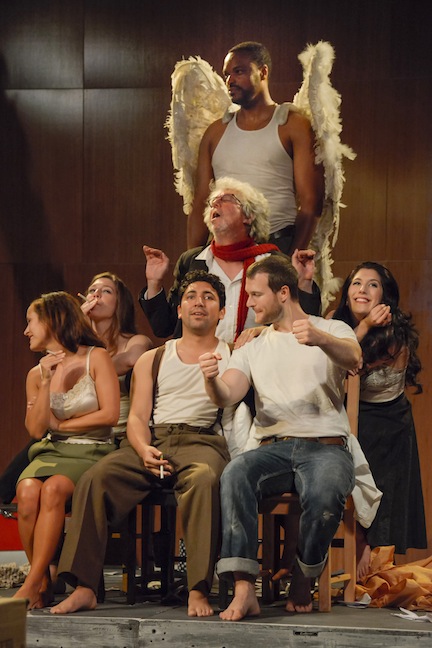
“The vast sadness of war gods”
Hydrogen Jukebox, the operatic collaboration between Philip Glass and Allen Ginsberg, conceived of in the late 1980s and premiered in 1990 at the Spoleto Music Festival in Charleston, South Carolina, covers a slew of topics and ideas admired in the Bay Area. Topics such as, in Ginsberg’s words, “Buddhism, meditation, sex, sexual revolution … the notion of corruption in politics, and corruption of empire at the top … And war, of course, Peace, Pacifism.”
Written at the start of the George Bush era, the opera is a series of excerpts from Ginsberg’s writings over the years from the fifties to that moment when the US slid into the interminable wars that continue in the Middle East. There was the Moloch section from Howl, wonderfully sung by bass Kenneth Kellogg. A meditation from Cabin in the Rockies, movingly and sweetly sung by soprano Molly Mahoney while the narrator, the character of Ginsberg, sat in lotus position drinking tea with one of his six writhing Hindu arms. And there was some terrific harmonic choral work for the rhymed lyrics to Father Death, the song which ends this loosely knit opera and which was beautifully concluded in pianissimo lyrics sung by Efraín Solis.
Even Aunt Rose was there – where would Ginsberg be without Rose? – in her babushka. Tenor Jonathan Blalock singing a paean to her political commitments and sexual frustrations.
The piece begins as a train trip across Oklahoma, and the motif of travel across the broad plains of the US is central to the piece. It works perfectly with Glass’ minimalist gestures: there is the sound of wheels turning on iron, conjuring the rocking, repetitive motion of the cars in its musical figures, the roll and pitch supported by the clack of precisely realized percussion. The sound of the train was reflected in the tread of ninety-nine soldiers moving across the landscape, conducting their own peculiar search for their own questionable motives. “Who,” Ginsberg asks, “is the enemy, year after year, war after war?” The six singers marched in time, clustered on the tiny stage.
“I search for the language that is also yours.”
Originally the six singing parts represented American archetypes: a waitress, a policeman, a businessman, a cheerleader, a priest and a mechanic. Those archetypes were effaced in this production, replaced most consistently perhaps by new sexual configurations divided into three couples: a man and a woman, two men, two women. This shift in characterization was closer to what Ginsberg might have wished had he been born in the seventies, and it allowed for a greater range of portrayals than the stereotypes left over from fifties nostalgia may have allowed. Stage Director Elkhanah Pulitzer’s staging rocked on with the insistent freedoms that were part of Ginsberg’s intent.
The travel motif continued throughout the opera, growing more and more raucous as the action proceeded. The scene with the two stewardesses provided a charming sequence of audience interaction, with lots of paper airplanes sent flying from stage to audience, audience to stage. Soprano Sara Duchovnay and mezzo Nicole Takesono were splendidly iconic.
The core of this really fun and really smart songspiel, however, was the long sequence from Wichita Vortex Sutra, Ginsberg’s 1966 anti-war poem. Written as an audio recording while Ginsberg was traveling in the back of a bus across Kansas, the poem looks out over the Midwest and contemplates the complacency that leads the country constantly into war. The poem was the first collaboration between Ginsberg and Glass, with Glass accompanying on piano; it became the heart of the opera. The sequence was performed by Howard Swain as Ginsberg and the production’s conductor David Möschler at the keyboard of an out-of-tune, honky-tonk upright piano. Swain’s performance was brilliant and quirky. Riding the line between the rhythms of Ginsberg and his own personal interpretation, Swain never lapsed into mimicry but fully inhabited the role and the language. Möschler’s performance was equally committed and impressive.
Everyone did Allen proud.
– Jaime Robles
West Edge Opera’s 2014 Summer Festival continues with two more performances of Hydrogen Jukebox on Saturday, August 2, and Friday, August 8, at 8 p.m. Performances are at the Ed Roberts Campus, Berkeley. For tickets and information call 510-841-1903, or visit www.WestEdgeOpera.org. Two other operas, La Boheme and The End of the Affair, are also scheduled during the festival.
Photo: Kenneth Kellogg (top) as the Angel, Howard Swain (immediately below) as Allen Ginsberg, and (left to right) Nicole Takesono, Molly Mahoney, Efraín Solis, Jonathan Blalock and Sara Duchovnay driving across America in Phillip Glass’ opera of the poetry of Allen Ginsberg, Hydrogen Jukebox, presented by West Edge Opera at the Ed Roberts campus in Berkeley. Photo by mellopix.
